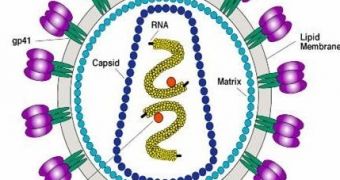Rabies was as invincible as HIV.
Now this ancient scourge could offer itself in defeating the plague of the XX century: HIV.
A team at Jefferson Medical College in Philadelphia has employed a drastically weakened rabies virus to transport HIV-related proteins into animals, like vaccinating them against an AIDS-like disease.
Early trials reveal that the vaccine, which doesn't defend against infection, impedes the development of the disease.
The team, led by Dr. Matthias Schnell, professor of microbiology and immunology, found that two years after the first vaccination, four vaccinated rhesus macaques were protected from disease, even after being "challenged" with a dangerous animal-human virus while two control individuals developed a monkey AIDS type.
The team inserted two different viral proteins into the rabies virus genome, achieving viruses-based vaccines.
One molecule was a glycoprotein from the HIV surface, while the other was an inner protein from the simian immunodeficiency virus (SIV), as human HIV is harmless in monkeys.
Such rabies "vehicles" would activate a strong reaction from the monkey's immune system, even if the rabies virus, in this variant, cannot cause rabies disease as this was a rabies vaccine strain that has been employed for over 20 years in oral vaccines against rabies in wildlife in Europe.
The research's goal was to check the safety and effectiveness of the rabies vaccine against HIV and related diseases.
Four macaques received both vaccines, while two animals just a weakened rabies virus.
After the initial vaccination, they tried two different immune system boosts without any visible reaction from the monkeys' immune systems.
Then they created a new vector, carrying a viral surface protein from another virus, vesicular stomatitis virus (VSV).
Two years after the initial vaccine shot, they administered a booster vaccine with the rabies-VSV vector, and watched the SIV/HIV-specific immune responses.
The group then stimulated the animals with SIV and assessed various infection parameters, like immune system CD4 cell count, virus level in the bloodstream and immune system antibody response.
The animals that received the test vaccine could stop the infection while the control animals displayed high levels of virus and a loss of CD4 cells.
"We still need a vaccine that protects from HIV infection, but protecting against developing disease can be a very important step," said Schnell.
He warned that it is not known how long the viral immunity lasts.
"The results indicate the need for future studies in larger groups of animals, and that these currently are underway. In addition, one key question remains unanswered: Is such a rabies-based vaccine feasible as an HIV vaccine in humans?" added Schnell.

 14 DAY TRIAL //
14 DAY TRIAL //